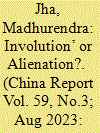|
|
|
Sort Order |
|
|
|
Items / Page
|
|
|
|
|
|
|
| Srl | Item |
| 1 |
ID:
193179


|
|
|
|
|
| Summary/Abstract |
‘Nei Juan (内卷)’, translated as ‘involution’, was the ‘buzzword’ in Chinese social media in the year 2020. With ‘involution’, two more phenomena widely known as the ‘Sang Wenhua (丧文化)’, loosely translated as the ‘culture of dispiritedness’ and ‘Tangping Zhuyi (躺平主义)’, loosely translated as ‘lying flat-ism’, gained currency. If ‘involution’ is the issue the urban youth of China is facing in a commercialised and competitive China of today, then ‘dispiritedness’ seems to be its symptom, and ‘lying flat-ism’ its cure being adopted by the ‘dispirited’ youth. As a result, a few questions naturally arise. Is ‘involution’ a new issue that the Chinese urban youth is encountering today? Or is ‘involution’ in itself yet another symptom of a larger issue, ‘alienation’? My inquiry into these questions makes me turn towards films. To find the answers, I take up the works of Jia Zhangke, the central theme of whose works I describe as ‘the desultory wanderings of the alienated souls’. I argue that a critical and close reading of his ‘Hometown Trilogy’, will present us with such youth, who in the face of the rapid changes brought by the post-1979 economic reforms, were filled with a sense of powerlessness, meaninglessness, normlessness, isolation and self-estrangement, all forms of alienation as proposed by Melvin Seeman. I also look into the genesis of ‘involution’ and its manifestation to argue that the Chinese urban youth experiencing ‘involution’ and thereby ‘dispiritedness’, are experiencing the same subjective feelings of alienation as experienced by the youth in the Jia’a ‘Hometown Trilogy’.
|
|
|
|
|
|
|
|
|
|
|
|
|
|
|
|
| 2 |
ID:
193220


|
|
|
|
|
| Summary/Abstract |
This article concentrates on four Chinese blockbuster movies, Wolf Warrior (2015), Operation Mekong (2016), Wolf Warrior 2 (2017) and Operation Red Sea (2018), referring to them collectively as the “wolf warrior cycle” on the basis of their shared themes of China's overseas military actions. To understand why films addressing this topic have emerged since the mid-2010s, the article employs a critical political economy approach and situates the wolf warrior cycle in China's transforming foreign policies. It argues that the Belt and Road Initiative, one of the state's prominent foreign policies and global strategies in this period, played a crucial role in shaping the production of the wolf warrior cycle films under a trend of the politicization of commercial blockbusters in the Chinese film industry. In turn, these films contributed to the formation of the “wolf warrior diplomacy” image by reinforcing the proactiveness of China's diplomacy and nationalistic stereotypes in Chinese society towards international relations.
|
|
|
|
|
|
|
|
|
|
|
|
|
|
|
|
|
|
|
|
|